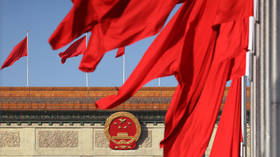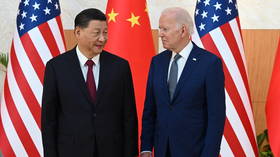Time for a ‘queen’? Has Kim Jong-un just unveiled North Korea’s next leader?
Pyongyang’s dynasty may take a radical new turn in its eventual fourth iteration
A new and unusual star has emerged on the North Korean political scene: a girl of somewhere between the age of ten and twelve. Perhaps Kim Jong-un is trying to be a responsible ruler – given that the country is an absolute monarchy – and has decided not to repeat his father’s mistakes. Instead, he’s preparing in advance for an heir to the throne out of concern for stability and keeping power in the hands of his family.
On November 18, the Hwasong-17 intercontinental ballistic missile was test-fired from Pyongyang’s Sunan International Airport, which had been closed for several years due to the pandemic. What caught the attention of observers, however, was not the fact of another ICBM launch, but the presence at the event of a pre-teen girl. She appeared with her father and mother, supreme leader Kim Jong-un and his wife, Lee Sol-ju. It soon emerged that the girl’s name is Kim Ju Ae and that she is the second daughter of North Korea’s ruling couple.
The appearance of a North Korean leader in public with his children is in itself an unprecedented step. And Kim Ju Ae’s presence was a signal that tradition is changing in this area. Between the end of November and the end of February, Kim Ju Ae made six public appearances. Of particular interest is her attendance, on February 7, at a reception to mark the 75th anniversary of the North Korean armed forces. The photos published in the official press show the girl seated at a banquet table, with her father on her left and her mother on her right, and four army generals in full uniform, standing at attention behind them.
Kim Ju Ae’s frequent public appearances and the sudden attention she has received from the official press have led many to speculate that Kim Jong-un has decided to appoint the girl as his successor. The choice of a woman as the ‘next Kim’ should not be surprising in itself: by the standards of North Korea’s elite, Kim Jong-un can be considered liberal on gender issues and often appoints women to senior positions (Foreign Minister Choi Seong-hee is just one of many examples).
Nevertheless, the decision to possibly nominate an heir who is not even a teenager is unprecedented. But there may be a reason for it.
The decision that hereditary succession was ideal for North Korea and its ruling class dates back to the 1960s, during the reign of Kim Il-sung, Kim Jong-un’s grandfather. This move was probably influenced by events in the USSR following the death of Joseph Stalin. It came as a shock to Kim Il-sung that people from the late leader’s inner circle were at the forefront of posthumous criticism. Seeing this, Kim Il-sung probably came to the conclusion that he needed to appoint a successor while he was still alive.
Soon, however, Kim Il-sung had to learn a second lesson. Mao Zedong famously used a similar logic to appoint a successor. That person was the then commander-in-chief of the Chinese army, Lin Biao. However, Lin Biao decided not to wait for the great helmsman’s death and attempted a coup d’état in which he died.
Based on the experience of the two Communist giants, Kim Il-sung probably concluded that his successor should be someone who would not be tempted to increase his own support by organizing a campaign of posthumous criticism, and who would not be tempted to speed up the process and remove him from power without waiting for his natural death. Clearly, only one person could meet these criteria – the leader’s own son.
Kim Il-sung had several children by at least two women, but he chose his first-born son, Kim Jong-il, who was born in Soviet Russia in 1941 (not 1942, as North Korean propaganda claims, but 1941, near Khabarovsk, where he was named Yuri, according to Soviet archival material).
For some reason, however, Kim Jong-il was in no hurry to follow his father’s example. Until the autumn of 2008, when he suffered a stroke, Kim Jong-il did not appoint an heir. There had actually been several attempts to do so, but they were quickly abandoned. It was only when Kim Jong-il realized the inevitability and relative nearness of his end that he named his third son, Kim Jong-un, as his successor. An unofficial campaign to glorify him began in 2009, while the future leader was formally introduced to the nation in October 2010.
Apparently, Kim Jong-un was expected to spend some time in ‘training’, accompanying his father on trips, attending meetings and learning the science of authoritarian rule in practice. But fate had a different plan: just a year after Kim Jong-un’s confirmation as successor, his father died unexpectedly. Kim Jong-un inherited power in December 2011.
Kim Jong-un seems preoccupied with preparing for succession at an early age – after all, he is not yet forty. Many observers have questioned whether Kim Ju Ae’s elevation clearly signals her new role as heir to the Juche throne. Well, a final decision has probably not yet been made – the candidate is too young. But the frequency with which she now appears at official events, and the central role she plays in them, suggests that Kim Jong-un has big plans for the middle daughter.
What prompted this haste is anyone’s guess. Leaving aside personal factors, or, to put it less politely, the whims of the North Korean leader (a man who sometimes tends to follow his emotions), there are at least three circumstances to consider.
Firstly, Kim Jong-un spent his teenage years in Europe and seems to have been influenced in many ways by the traditions of European monarchies. For example, he does not find it necessary to hide his wife from the public. On the contrary, since the first months of his reign, he has actively appeared in the company of Lee Sol-ju, with whom he seems to be genuinely in love. By this logic, it is not unusual that the ‘princess’, despite her youth, begins to play a certain social and political role at a very early age.
Secondly, if Kim Ju Ae is indeed to succeed to the throne, Kim Jong-un really needs to prepare both the state apparatus and the public for the idea that this time power will pass to a woman. In principle, the status of women in North Korean society has improved considerably over the past 20 or 30 years. Nevertheless, the decision to nominate a woman for the top post may cause some confusion in the country. It is possible that Kim Jong-un has decided to quell this confusion by gradually make the population accustomed to his unorthodox decision.
Thirdly, it cannot be ruled out that Kim Jong-un has learned the lessons of his father, who, despite his health problems, left the decision until the last moment. Of course, the health of the leader is one of the most closely guarded secrets, but it seems to leave much to be desired. In this case, Kim Jong-un, as a responsible ruler in an absolute monarchy, must not repeat his father’s mistakes out of concern for the stability of the country and the preservation of power in the hands of his family, but must begin to prepare in advance for an heir.
In short, a new and unusual star has emerged on the North Korean political scene.








Comments are closed.